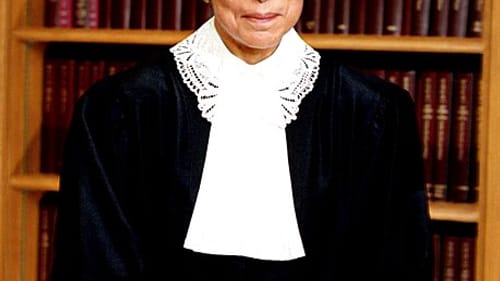Stay in the Loop
BSR publishes on a weekly schedule, with an email newsletter every Wednesday and Thursday morning. There’s no paywall, and subscribing is always free.
Feminism without the Judaism?
Mimi Leder’s ‘On the Basis of Sex’

When On The Basis of Sex, a biopic about Supreme Court justice Ruth Bader Ginsburg, was announced last year, the casting of Felicity Jones in the leading role caused some consternation in some Jewish cinéaste circles — especially since, earlier in the film's development, Jewish actor Natalie Portman had been in line to play the role.
Tablet, at the time, denounced the casting of the English, gentile Jones as "The De-Jewification of Ruth Bader Ginsburg" and called it a "shanda" that a Jewish actress wouldn’t be playing the judge. Ginsburg is, in her 80s, a cultural icon among millennials — Jewish and otherwise — but her Jewishness is an important element of her story.
Norman and Mrs. Maisel
Having now seen the film, I have no objection to casting a non-Jew in a Jewish role. It's called acting, after all, and there's a long history of gentiles convincingly playing Jews. In last year's Norman, Richard Gere portrayed a Jewish fixer and Steve Buscemi a rabbi, both very well. And I've never not believed Rachel Brosnahan as a 1950s New York Jew on The Marvelous Mrs. Maisel, even though Brosnahan is of English/Irish ancestry, isn’t Jewish, and was born in Wisconsin in 1990.
However, I do have a related objection to On the Basis of Sex: Aside from a single brief scene, there's no mention of Ginsburg being Jewish at all, so the film overlooks a fascinating angle.
Feminism without the Judaism
RBG, the Oscar-shortlisted documentary from earlier this year that provided rare access to a sitting Supreme Court justice, provides more a complete picture of Ginsburg.
Much like 2017's Marshall, a biopic of Thurgood Marshall that was entirely about one case from his pre-SCOTUS career, On the Basis of Sex gives us a depiction of young Ginsburg, prior to her time on the court.
The first third of the film shows us Ginsburg at Harvard Law School in the early 1950s, as one of few women in her class. The rest focuses on Ginsburg's involvement, as a lawyer in the early 1970s, in a landmark sex-discrimination case.
Throughout, Ginsburg and her husband Martin (Armie Hammer) go toe-to-toe with the old-line WASP establishment, both at Harvard and in the government, as personified by Erwin Griswold (Sam Waterston), a Harvard dean turned Nixon solicitor general. The film repeatedly shows that the old guard was highly invested in traditional gender roles and afraid feminism would encroach on their way of life.
That's undoubtedly accurate, but the film sheds almost no light on the Ginsburgs’ Jewish identity, nor on that of a presumably Jewish ACLU lawyer (Justin Theroux) as they challenge the authority of the ruling elite together. Aside from one scene, in which Ginsburg tells a job interviewer that, between being Jewish and a woman, she's had trouble getting hired out of law school, Judaism is never mentioned.

Mostly believable
I'm not accusing the filmmakers of anti-Semitism, especially since most of them are Jewish. Director Mimi Leder, was the signature director on the great HBO series The Leftovers, and the screenwriter is Daniel Stiepleman, who happens to be Ginsburg's nephew. But this filmmaking team makes it even more surprising that the movie mostly erases this piece of Ginsburg’s story.
There are other general problems with the film. It often feels like a made-for-TV movie, and its depiction of legal concepts never digs very deep. The film was also criticized for a scene in the trailer in which Ginsburg says that the word freedom does not appear in the Constitution (it does).
Jones is mostly believable in the role, but her approximation of Ginsburg’s Brooklyn accent comes through only intermittently. Instead of this film, Portman is currently starring in Vox Lox, where she shows she's much more able to maintain a distinctive outer-borough accent for an entire performance.
Hasty judgments
I avoid judging movies before anyone has seen them, especially when they're first announced. This time, however, it turns out that those who ripped On The Basis of Sex as not Jewish enough were right — though the problem turned out to be a matter of the script, not the star.
What, When, Where
On The Basis of Sex. Written by Daniel Stiepleman, Mimi Leder directed. Philadelphia area showtimes.
Sign up for our newsletter
All of the week's new articles, all in one place. Sign up for the free weekly BSR newsletters, and don't miss a conversation.

 Stephen Silver
Stephen Silver